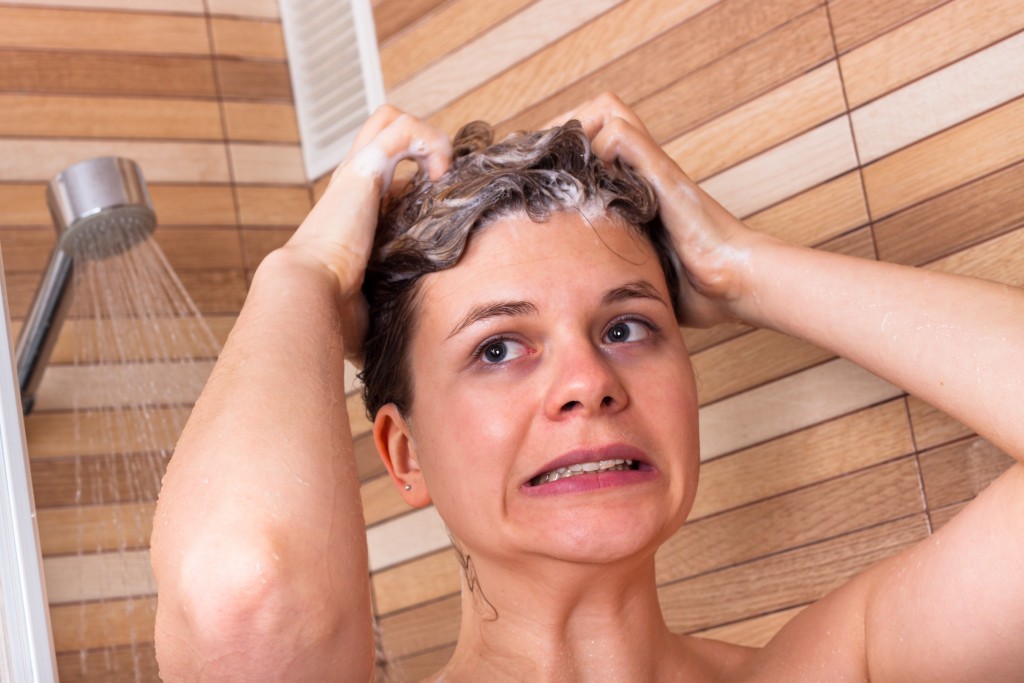Disclaimer: Curate Gifts. This site provides fashion and lifestyle content for informational purposes only.
How’s your hair? Did you notice one day that the hair you styled with your favorite rotating hair curler is no longer as vibrant, shiny, and bouncy as it used to be? Did you buy new hair products, thinking it could be the chemicals? So you bought natural, eco-friendly, sustainable products, and they still didn’t help? Finally, you noticed that your hair has gone dry, frizzy, and heavy, and you’re not sure what you’ve done wrong? It’s not your fault; it’s probably the hard water coming out of your shower that you’ve been using to wash your hair.
What is hard water, and how can you tell if it’s running through the pipes in your home? If you can’t seem to remove stubborn limescale and soap scum build-up around your tub or sink in the bath or kitchen, no matter how much scrubbing and cleaning you do, then you probably have hard water.
Hard water contains minerals that soap cannot wash away, leaving behind deposits that not only sit on your tub and washbasin but also in your hair. If you’ve ever felt your hair is unusually dry, limp, or dull, it may not be due to your hair products. Hard water could be the culprit. And if so, here are some tips on how to handle the hard water that’s wreaking havoc on your delicate hair.
Add a Shower Head Water Softening Filter
This type of filter will reduce and remove minerals such as calcium and magnesium that cause your hair to feel dull and lifeless and, in some extreme cases, hair loss and eczema. Installing a quality shower head water softening filter can not only bring your hair back to a healthier state, but your skin and the rest of your body will also thank you. Consider these before you purchase one:
- Material — Choose a rustproof material. It may be expensive, but the better the quality, the longer it lasts.
- Filter Lifespan — Look into how long the cartridges will last. If your household is large, then you may need to change it more than twice a year.
- Appropriate Specs — Take proper measurements of your shower head before selecting a filter as they come in many sizes. Make sure the filter you purchase can be adapted to the one you have at home.
- Water Pressure — Some filters may change the intensity of the water pressure, so consider this factor when shopping for a filter.
- Cost — Obviously, the highest quality filter can be more expensive, but there are mid-range prices available that can suit your needs.
- Weight — It’s important to check the filter that you purchase is not too heavy or bulky for everyone in your family to use.
Use Clarifying Shampoo
If you have hard water at home, or notice a lot of build-up from applied hair products, or have been swimming a lot in a chlorinated pool, using clarifying shampoo can help remove hard water residue and protect your hair from chlorine damage. Clarifying shampoo should be used sparingly, though. Some stylists recommend using it once a month, as it performs a deep clean of your hair. If used too often, it can cause dryness as it can deplete your hair’s natural oils. You should also follow up with a moisturizing conditioner afterward.
Make Your Own Natural Rinse

If you don’t have any clarifying shampoo on hand, you can make yourself a natural rinse that can temporarily relieve you of mineral build-up. Mix one tablespoon of natural acid of choice (apple cider vinegar, lemon juice, or lime juice) to three cups of purified bottled water and massage the solution through hair that’s been shampooed, rinsed, and still wet. Let it sit for five minutes and then rinse out with cold water thoroughly. Conditioning is not necessary after the rinse. Due to the acidic nature of the ingredients, this process should only be done once every two weeks or longer.
Use Leave-in Conditioners and Moisturizing Masks
If you feel your hair has lost its shine due to hard water residue build-up, it helps to add a few drops of natural leave-in conditioner after you’ve shampooed and towel-dried your hair to bring more gloss and seal in the moisture. Choose coconut oil, argan, jojoba, or almond oil to give you that smooth effect. Applying moisturizing masks once a week can also help seal in the moisture if the effects of hard water are bringing dryness to your hair.
Daily life can be hectic, and even if you’re working from home, it’s hard not to notice your hair is looking neglected and requires some TLC. A proper filtering system in the home or even installing a shower head water softening filter is a good start to bringing back healthy hair and making hard water problems to your hair a thing of the past.

